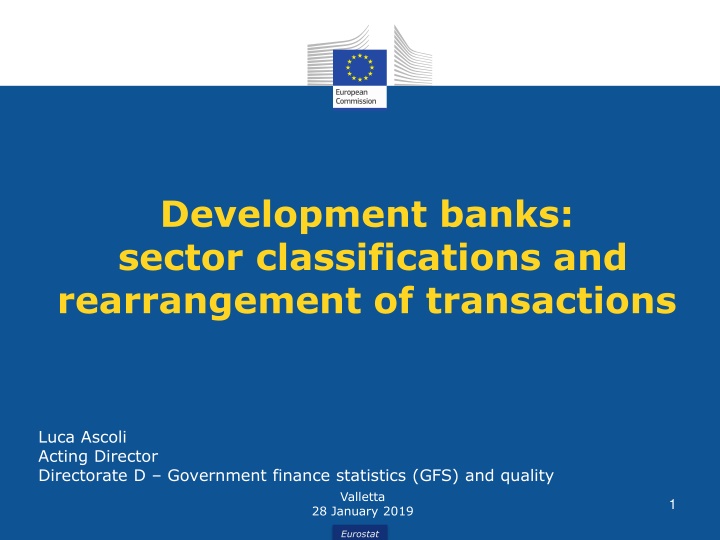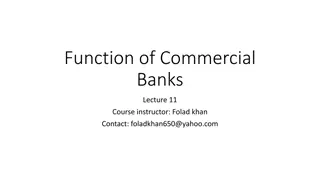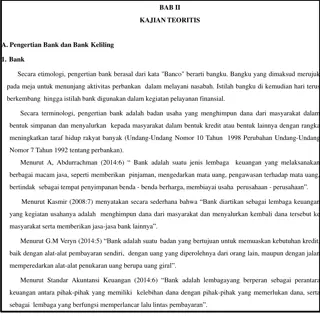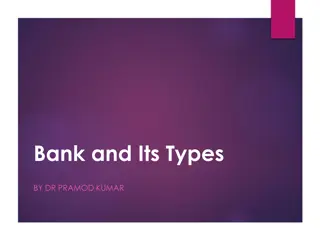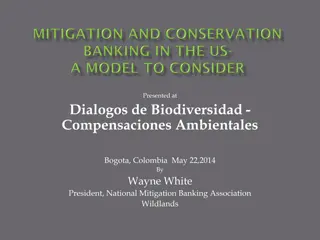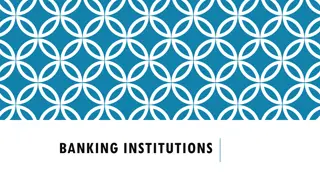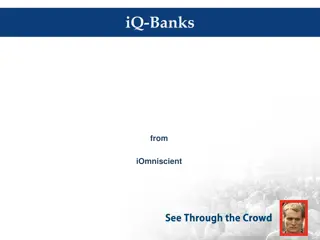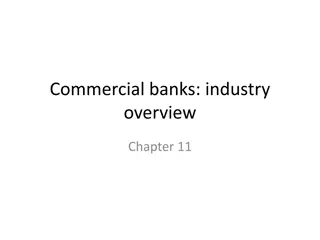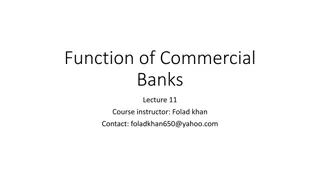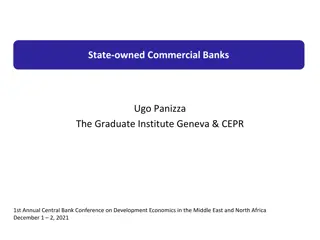Overview of Development Banks and Their Functions
Development banks, including national and foreign entities, play a crucial role in promoting economic, social, and environmental development by financing projects that may not receive adequate private funding. These banks are typically government-owned but may have mixed or private ownership. They are established to implement government policies and often operate with exemptions from certain legal requirements. Development banks do not focus on maximizing profits like commercial banks but work towards driving development in various sectors.
Download Presentation

Please find below an Image/Link to download the presentation.
The content on the website is provided AS IS for your information and personal use only. It may not be sold, licensed, or shared on other websites without obtaining consent from the author.If you encounter any issues during the download, it is possible that the publisher has removed the file from their server.
You are allowed to download the files provided on this website for personal or commercial use, subject to the condition that they are used lawfully. All files are the property of their respective owners.
The content on the website is provided AS IS for your information and personal use only. It may not be sold, licensed, or shared on other websites without obtaining consent from the author.
E N D
Presentation Transcript
Development banks: sector classifications and rearrangement of transactions Luca Ascoli Acting Director Directorate D Government finance statistics (GFS) and quality Valletta 1 28 January 2019 Eurostat
What are Development Banks? National development banks (often referred to as promotional banks): active (mainly) on the domestic market Foreign development banks (for foreign development): active to support the government's development aid policy in developing and emerging markets Valletta 2 28 January 2019 Eurostat
Tasks of development banks Entities with a mandate to promote economic, social and environmental development, i.e. they serve to implement their government's policy Their aim is not to maximize profits as it is usual with commercial banks They finance projects which are particularly eligible from the public policy perspective, but which are not given (adequate) private funding as a result of market imperfections Valletta 3 28 January 2019 Eurostat
How are development banks set-up? They are often fully government owned but mixed ownership or even full private ownership is also possible Not necessarily have to be banks in the 'legal sense' they may also be established and operated as special bodies or funds Legal and organizational form depends on country-specific rules, policy decisions and the (business) strategies They often have also a substantial part of 'regular' business activities Valletta 4 28 January 2019 Eurostat
How are development banks set-up? Compared to other types of public banks they usually do not have deposit business (wholesale and retail deposits), exemptions may exist They are often released from some of the legal requirements that are usually to be fulfilled by commercial banks (e.g. CRD IV, BRRD) They usually benefit from explicit or implicit government guarantees on their liabilities and/or assets Valletta 5 28 January 2019 Eurostat
New wave of development banks Since 2008, mostly to mitigate the consequences of the financial crises New development banks created (e.g. PT, UK, IE) Existing development banks were reorganized Increased cooperation between development banks Junker Plan promotes the creation of development banks Provision of financial means for co-financing Identifying or preparing suitable project for EFSI support Valletta 6 28 January 2019 8 Eurostat
Statistical issues in EDP/GFS In which sector should a development bank be classified? General government sector Financial corporations sector Are some activities of a development bank to be rearranged? Acting as an agent of government Exposure to risks and rewards Non-market activity Valletta 7 28 January 2019 Eurostat
Rules for sector classification of development banks No special rules for development banks Applicable are, as for all other financial entities: ESA 2010 chapter 2 on units and grouping of units; ESA 2010 Manual on Government Deficit and Debt (MGDD) 2016 edition: Chapter I.5 on units engaged in financial activities, Chapter I.6 on specific public entities. However, the set-ups of development banks vary significantly and therefore their statistical recording requires a detailed case-by-case analysis Valletta 28 January 2019 8 Eurostat
What is financial intermediation in ESA 2010? The activity in which an institutional unit acquires financial assets and incurs liabilities on its own account by engaging in financial transactions on the market. Financial intermediary does not only act as an agent for other institutional units, but places itself at risk by acquiring financial assets and incurring liabilities on its own account. Memo: MFI list Valletta 9 28 January 2019 Eurostat
When a development bank can be classified inside government? Three issues to be considered Governance (control / decision-making autonomy) Captive financial entity Majority if the transactions is rearranged via government accounts Valletta 10 28 January 2019 8 Eurostat
When a development bank can be classified inside government? Governance, i.e. entity de facto has no autonomy of decision: Government officials constitute majority in a board of directors / management board Government officials constitute majority in key committees (or sub-committees) of the entity having a decisive role on key factors of its investment policy Development bank stops being a mean of government policy but simply executes operations on behalf of government Valletta 11 28 January 2019 Eurostat
When a development bank can be classified inside government? Bank is a public captive institution: carries out a limited range of activities in the framework of public policy objectives, and government influence or constraints are evidenced simultaneously on its assets and liabilities, and it does not behave like a 'normal' commercial entity (e.g. there is no expectation of a market rate of return on equity) Development bank is not a financial intermediary as it does not place itself at risk and most of its assets and liabilities are not transacted on open markets Valletta 12 28 January 2019 Eurostat
When a development bank should be classified inside government? Assessing whether the DB carries out a limited range of activities in narrow conditions require the analyses of the governance structure Where do the members of the committees come from and who delegates the members of the committees? Tasks (lending, programme planning etc.) of the supervisory and management bodies and committees Tasks of the bodies and committees with regard to day-to-day business (e.g. authority to issue directives, approval of transactions, certain institutions etc.) Valletta 13 28 January 2019 Eurostat
When a development bank should be classified inside government? Assessing whether the DB carries out a limited range of activities in narrow conditions require the analyses of the governance structure Under what procedures is the daily business conducted (who decides on the procedures, is approval necessary) Are the investment activities restricted, i.e. beyond the restrictions made in the general mandate Competition may be an argument but state aid usually require that the business is competition-neutral Valletta 14 28 January 2019 Eurostat
When a development bank should be classified inside government? Constraints on the asset side mean that the parent imposes the conditions on the nature of assets that the DB can hold type and size of its interventions the return on some assets (interest rates, fees, etc.) characteristics of the beneficiaries of the activity Need of ex-ante authorisation by the parent Valletta 15 28 January 2019 Eurostat
When a development bank should be classified inside government? Constraints on the liability side mean that the parent imposes the conditions on the borrowing: need of government authorisation financing mainly provided by government existence of government guarantees possibility to take deposits from the public Valletta 16 28 January 2019 Eurostat
When a development bank should be classified inside government? Shows the DB a behaviour like a 'normal' commercial entity: Main source of income, use of the profit, distribution of the profit Are there non-profitable operations (for what reasons are those operations carried out) Are losses automatically covered by government Does the DB try to work market-oriented (applying risk-based conditions even if the risk premiums may differ from commercial banks)? Valletta 17 28 January 2019 Eurostat
When a development bank can be classified inside government? Majority of its transactions is rearranged via government accounts: government is at the origin of the majority of its transactions, or bank is entrusted by government to perform tasks which contribute to the implementation of specific government policies/interventions Valletta 18 28 January 2019 Eurostat
Why do we rearrange transactions? Rearrangement is recording of a transaction/program in government accounts even if it was carried out by a development bank Rearranged transactions are recorded to "bring out the underlying economic relationships more clearly" (ESA2010, 1.72) Current MGDD provides already some guidance on rearrangement No special rules for development banks; the same guidelines are applicable to all financial and non-financial corporations On-going methodological work on more extensive guidance on rearrangement of transactions Valletta 19 28 January 2019 Eurostat
When do we rearrange? When a development bank is: A. Acting as a 'government agent' or at government request with regard to a specific transaction/program B. Sharing with government 'exposure to risk and rewards' with regard to a specific transaction/program C. Carrying out a non-market transaction/program Valletta 20 28 January 2019 Eurostat
Bank acts as a 'government agent' or at government request (A) What is considered as a government request? Government request is an instruction that results in limiting the operational autonomy of the bank with regard to the specific transaction/program or government influences the day-to-day management of a transaction/program General mandate given by government to the entity in its role as an owner (on general policy and/or strategy) is not considered as a request What is meant by acting as 'government agent'? Following the request, government takes all the risks and rewards from the specific transaction/program: a bank acts as 'accounting tool' for government, which is often reflected in its annual report (through separated accounts) Valletta 28 January 2019 21 Eurostat
What indicates government request? a) There is evidence that government has requested the bank to carry out the specific transactions through instruction (decree, formal letter, official statement, decree) or any other evidence statements in annual reports (of units concerned, of supervisory authorities, of auditors) b) Government predetermines most of terms of a transaction or a program (e.g. interest rate, individual beneficiaries, loan amounts, etc.) such that the bank's ability to effectively influence the contracts becomes negligible c) Government representatives constitute the majority of members in investment committees of the bank deciding on the specific transaction (persons representing the executive, legislative or judicial government powers) Valletta 22 28 January 2019 Eurostat
Bank shares with government 'exposure to risk and rewards' (B) A development bank acts for government taking no or minor risks but it is interested in getting the rewards Government provides the general framework of a transaction/program and it does not impact the day-to-day management of a transaction (e.g. by a specific request as it was in case A) Bank shows high involvement in implementation of a transaction and it has incentives to perform at best (to get rewards in form of a larger operating margin) Usually, government takes over risks through the existence of dedicated guarantees Valletta 23 28 January 2019 Eurostat
What indicates 'sharing risk and rewards'? When government imposes the general framework of a transaction/program and if: a) Government assumes substantially most of the risks and rewards related to a transaction/program, despite a development bank has legal ownership. b) A bank is compensated for at least half of the losses arising from the transaction. This is a case when transaction is accompanied by dedicated government guarantees. Valletta 24 28 January 2019 Eurostat
Bank carries out non-market transactions (C) Government influence does not always have to be demonstrated by the existence of the legal instructions to undertake a specific transaction/program In some cases, government influence is recognised through the mere (non-market/non-commercial) characteristics of the transaction/program (in form of subsidies or transfers) Valletta 25 28 January 2019 Eurostat
What indicates non-market transaction? The conditions used in the contract between the business partner and the bank are set below the terms usually applied by the entity, in particular not covering the administration and borrowing cost incurred The contract is fundamentally associated with losses The bank enters into rescue operations linked to financial and non- financial institutions with burden is out of proportion to the possible benefits resulting from such operation Valletta 26 28 January 2019 Eurostat
Impact on government accounts Various statistical impacts possible both on deficit and debt Actual impact depends on a specific rearrangement issue as well as on the original recognition in the government source data Some examples: Impact on debt: rearrangement/re-routing of loans granted by a development bank at the specific request of government Impact on deficit: re-routing of investment grants to beneficiaries provided at the specific request of government (if not already recognised as government expense in source data); possible impact on debt depends on the specific case Valletta 27 28 January 2019 Eurostat
Main issues in nutshell Sector-classification of development banks Governance Captive financial institution Rearrangement of majority of transactions Rearrangement of particular transactions of development bank via government accounts Valletta 28 28 January 2019 Eurostat
Conclusions Activities of development banks are challenging area for government statistics as they are strongly oriented towards the interests of government On-going methodological work to harmonise accounting practices in the Member States Case-by-case analysis Valletta 29 28 January 2019 Eurostat
Thank you for your attention! Valletta 30 28 January 2019 Eurostat
Development Banks (DBs) and National Promotional Banks (NPBs) Overview on the current classification of DBs/NPBs DB/NPB Austria Wirtschaftsservice (aws) sterreichische Entwicklungsbank Belgina Investment Company for Developing countries Kreditanstalt f r Wiederaufbau (KFW) * Landwirtschaftliche Rentenbank Country AT AT BE Sector S.13 S.12 S.13 DE DE S.12 S.12 * Substantial part of the balance sheet is rearranged to government. Valletta 31 28 January 2019 Eurostat
Development Banks (DBs) and National Promotional Banks (NPBs) Overview on the current classification of DBs/NPBs DB/NPB Landesf rderinstitut Mecklenburg- Vorpommern** Bulgarian Development Bank (BDB) Cyprus Development Bank Czech Export Bank Czech - Moravian Guarantee and Development Bank (CMZRB) KredEX Country DE Sector S.13 BG CY CZ CZ S.12 S.12 S.13 S.13 EE S.13 ** 16 additional regional NPBs in Germany (currently all in S.12) but part of the balance sheets rearranged to government. Valletta 28 January 2019 32 Eurostat
Development Banks (DBs) and National Promotional Banks (NPBs) Overview on the current classification of DBs/NPBs DB/NPB Country EE Sector S.13 Estonia development fund Maeelu Edendamise EE S.12 Institution for Growth (IFG) Instituto de Credito Oficial (ICO) Finnvera FinnFund State Pension Fund (Sovereign Wealth Institute-VER) EL ES FI FI FI S.13 S.12 S.12 S.12 S.13 Valletta 33 28 January 2019 Eurostat
Development Banks (DBs) and National Promotional Banks (NPBs) Overview on the current classification of DBs/NPBs DB/NPB Country FR Sector S.12 Agence Fran aise de D veloppement Banque Publique d Investissement (BPI) Caisse des d pots et consignations CDC) Croatian Bank for Reconstruction and Development AGENCY, CENTRES FOR DEVELOPMENT Magyar Fejleszt si Bank Z rtk r en M k d (MFB) FR FR HR S.12 S.12 S.13 HR HU S.13 S.12 Valletta 34 28 January 2019 Eurostat
Development Banks (DBs) and National Promotional Banks (NPBs) Overview on the current classification of DBs/NPBs DB/NPB Country HU IE Sector S.13 S.13 Eximbank Strategic Banking Corporation Ireland (SBCI) Cassa Depositi e Prestiti Invega Agricultural Credit Guarantee Fund VIPA (Public Investment Development Agency) IT LT LT LT S.12 S.13 S.13 S.12 Valletta 35 28 January 2019 Eurostat
Development Banks (DBs) and National Promotional Banks (NPBs) Overview on the current classification of DBs/NPBs DB/NPB Country LU LU Sector S.12 S.12 National Credit and Investment Institution Investing for development-Luxembourg Microfinance and Development Fund (SICAV) LuxDev Altum Malta Development Bank (MAB) BGK Bank LU LV MT PL S.13 S.13 S.12 S.12 Valletta 36 28 January 2019 Eurostat
Development Banks (DBs) and National Promotional Banks (NPBs) Overview on the current classification of DBs/NPBs DB/NPB Country PT Sector S.13 Institui o Financeira do Desenvolvimento (IFD) Eximbank RO S.12 Swedfund International AB SE S.13 Almi Invest AB SE S.13 Slovenska Zaru na a Rozvojova Banka SK S.12 Slovenska izvozna in razvojna banka (SID) British Business Bank and Green Development Bank SI S.12 UK S.13 Valletta 37 28 January 2019 Eurostat
